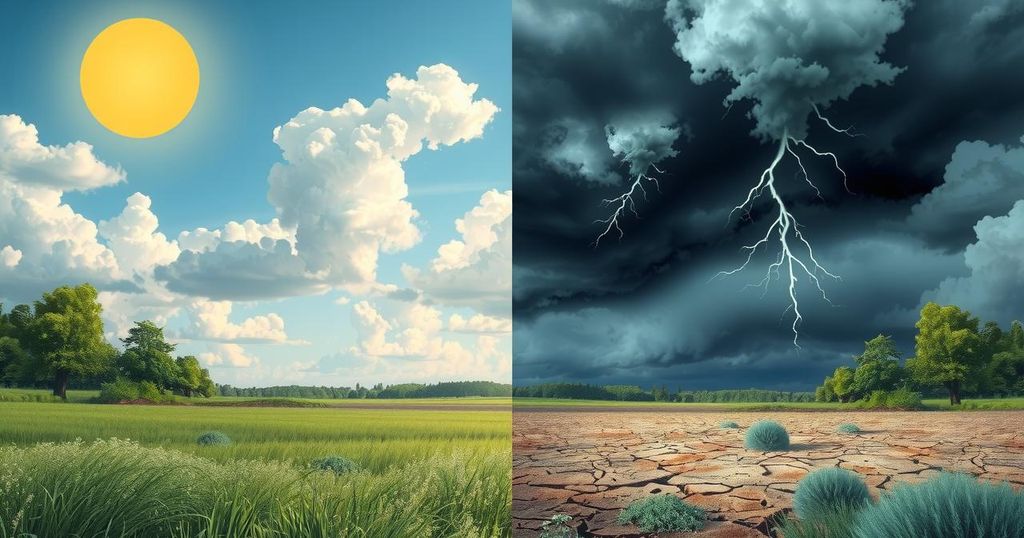Examining the Complex Relationship Between Weather and Climate Change

The year 2025 commenced with extreme weather events, including severe winds and winter storms. Researchers now link these changes to human-caused climate change, highlighted by the hottest year recorded in 2024. With advanced climate science, the growing impacts of climate change on weather phenomena can now be clearly assessed. Though not all weather can be directly linked to climate change, the evidence of its influence is undeniable.
The year 2025 commenced with unprecedented weather phenomena, including extreme winds reaching 100 mph in Southern California, which contributed to destructive wildfires. Concurrently, severe winter storms affected the Mid-Atlantic and Southern regions of the United States. Amidst these events, the scientific community announced that 2024 had been recorded as the hottest year in history, attributing this to human-induced climate change.
Traditionally, climate scientists hesitated to directly link individual weather events to anthropogenic climate change. However, advancements in climate research over the past decade have empowered scientists to clearly identify the influence of climate change on various weather disasters such as heat waves, hurricanes, and wildfires.
It should be noted that not all weather variations can be clearly connected to climate change. Yet, Justin Mankin, a climate scientist at Dartmouth College, asserts that the consistent rise in global temperatures is discernibly impacting numerous extreme weather events, suggesting that historic weather patterns are shifting significantly. He states, “The trends in climate are shaping new weather possibilities that were maybe unprecedented.”
The distinction between climate and weather is essential; climate denotes long-term patterns, while weather refers to short-term variations. Danielle Touma from the University of Texas, Austin, explains it as akin to choosing daily attire based on current weather while expecting different seasonal wardrobes due to climate. The prevailing climate is defined by the average weather over a 30-year span, making unusual weather events relatively less consequential in the long-term data analysis.
Since the mid-1800s, global temperatures have risen approximately 1.3 degrees Celsius, largely due to increased fossil fuel combustion. Although this gradual warming may not lead to dramatic daily weather changes, it is subtly influencing conditions. Deepti Singh, a climate scientist at Washington State University, posits that daily weather experiences take place in an altered environment due to climate change effects.
For instance, regions in the United States, such as Michigan and Ohio, are witnessing fewer sub-freezing days, while heat waves have increased, occurring over three times more frequently since the 1960s. Further, a warming climate can disrupt atmospheric and oceanic patterns, resulting in unprecedented weather conditions. The extreme heat wave in the Pacific Northwest in 2021 exemplifies this phenomenon, directly correlated with climate change, while the atmospheric conditions necessary for this event were similarly outside previous experience.
The phenomenon of climate change encompasses natural shifts in Earth’s climate, now exacerbated by human activities such as fossil fuel consumption. Scientific inquiry into these changes is critical for understanding the associated impacts on global weather patterns, the frequency of extreme weather events, and the effectiveness of mitigation efforts. This knowledge is vital for policymakers and communities alike in preparing for and responding to climate-induced challenges.
In conclusion, while not all peculiar weather occurrences can be attributed to climate change, the increasing body of evidence illustrates that human activities significantly impact weather patterns and intensity. Advancements in climate science have enabled researchers to better understand these connections, emphasizing the importance of addressing climate change proactively. As global temperatures continue to rise, the influence on weather will likely become more pronounced, necessitating ongoing attention from the global community.
Original Source: www.kbia.org







